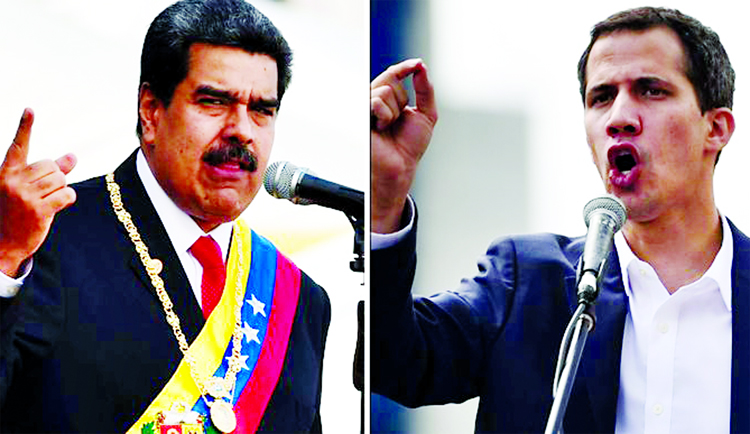
BBC Online :
Venezuelan opposition leader Juan Guaidó has said he would consider an amnesty for President Nicolás Maduro if he cedes power.
Mr Guaidó, who declared himself interim president on Wednesday, said he was reaching out to all
sectors including the military to end the crisis. Mr Maduro began a second term after polls marred by an opposition boycott and vote-rigging claims. The global community is split on whether to recognise his government.
But so far, Mr Maduro retains the crucial support of Venezuela’s military.
The US, more than a dozen Latin American countries, Canada and the UK have backed Mr Guaidó – who is leader of Venezuela’s elected National Congress – after he said he was the legitimate president.
But Russia has condemned foreign support for Mr Guaidó, saying it violates international law and is a “direct path to bloodshed”. China, Mexico and Turkey also back Mr Maduro. US Secretary of State Mike Pompeo has requested a UN Security Council meeting on the issue on Saturday.
At a meeting of the Organization of American States (OAS) on Thursday, he described Mr Maduro’s government as “morally bankrupt” and “undemocratic to the core”.
The Trump administration is working on a plan to funnel funds to Mr Guaidó, who is currently at an undisclosed location.
UN human rights chief Michelle Bachelet raised fears on Friday that the situation “may rapidly spiral out of control, with catastrophic consequences”, and called for an independent investigation into claims that Venezuela’s security forces used excessive force against protesters this week.
Mr Guaidó and his allies accuse Mr Maduro of usurping power through a fraudulent election.
Venezuelan opposition leader Juan Guaidó has said he would consider an amnesty for President Nicolás Maduro if he cedes power.
Mr Guaidó, who declared himself interim president on Wednesday, said he was reaching out to all
sectors including the military to end the crisis. Mr Maduro began a second term after polls marred by an opposition boycott and vote-rigging claims. The global community is split on whether to recognise his government.
But so far, Mr Maduro retains the crucial support of Venezuela’s military.
The US, more than a dozen Latin American countries, Canada and the UK have backed Mr Guaidó – who is leader of Venezuela’s elected National Congress – after he said he was the legitimate president.
But Russia has condemned foreign support for Mr Guaidó, saying it violates international law and is a “direct path to bloodshed”. China, Mexico and Turkey also back Mr Maduro. US Secretary of State Mike Pompeo has requested a UN Security Council meeting on the issue on Saturday.
At a meeting of the Organization of American States (OAS) on Thursday, he described Mr Maduro’s government as “morally bankrupt” and “undemocratic to the core”.
The Trump administration is working on a plan to funnel funds to Mr Guaidó, who is currently at an undisclosed location.
UN human rights chief Michelle Bachelet raised fears on Friday that the situation “may rapidly spiral out of control, with catastrophic consequences”, and called for an independent investigation into claims that Venezuela’s security forces used excessive force against protesters this week.
Mr Guaidó and his allies accuse Mr Maduro of usurping power through a fraudulent election.

